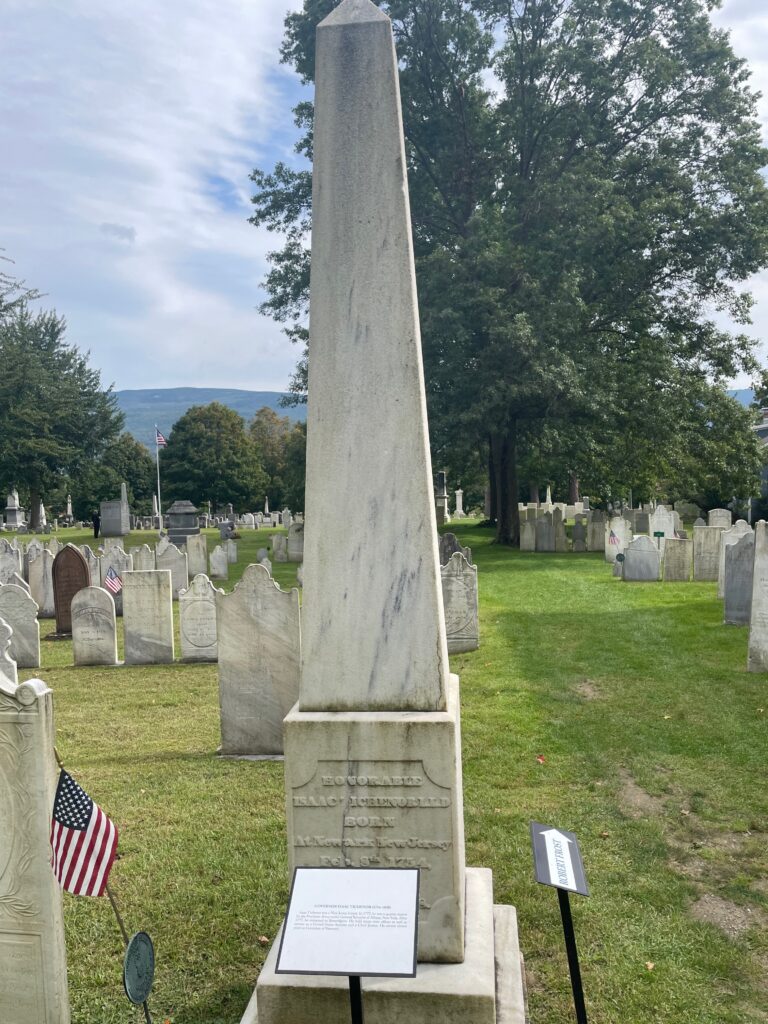Erik Visits an American Grave, Part 1,568
This is the grave of Isaac Tichenor.

Born in 1754 in Newark, New Jersey, Tichenor came from enough of an elite background to get to go to the College of New Jersey, today Princeton University, where he graduated in 1775. He wasn’t interested in sticking around though. He moved north, to Schenectady, New York, where he read for the law.
An eager supporter of the Patriot cause in the American Revolution, Tichenor headed to Bennington, Vermont and became involved in the war there. He was the commander of a militia company there and they were occasionally called up for actions in both Vermont and New York. He was also an Assistant Commissary General for the military. In other words, a useful guy. However, there were concerns from various officers that Tichenor was terrible at his job, that he showed neglect in storing and buying provisions, and that public money disappeared. It’s hard to really know. The new nation’s ability to fight the Revolution effectively was largely undermined by complete incompetence on all ends. Luckily, the nation had George Washington and the French intervention.
Tichenor was interested in politics as well and he would use his Revolutionary War service to rise in that society, which was not even one of the official colonies at the time of the Revolution. He was elected to the Vermont statehouse in 1781 and was Speaker of the House in 1783 before stepping away from the body in 1784. His greatest contribution in this period was being the person largely in charge to trying to convince the Continental Congress to let Vermont in as a state. That started in 1782 and it took all the way until the ratification of the Constitution for that to happen. The Continental Congress’ utter worthlessness is well-established, but the fact that it couldn’t even get around to allowing in a new state is something.
Finally, Vermont became a state in 1791. Tichenor wanted to go to Congress, but he didn’t win election. So he joined the state Supreme Court the same year and became Chief Justice in 1795. But still, he wanted to be where the action was. In 1796, Moses Robinson retired from his Senate seat in the middle of the term, which happened all the time back then. The state sent Tichenor to replace him. Although he was elected to a full term in 1796, he stepped down himself just a few months into it to become the state’s governor.
It should almost go without saying that Tichenor was a good Federalist through all of this, as was most of the political elite of New England. But in Vermont more than the other states that began to change. The Jeffersonians were slowly gaining power there. Perhaps it’s not surprising. Vermont was the nation’s first state with no access to the ocean and so was less connected to the trading elite of the time. Moreover, its small, democratically oriented farmers ended up having more in common with other small farmers than with the increasingly dominant merchant class of the Federalists. So Tichenor had to fight to stay in power. These were one-year terms and so he had to run for election constantly. He won consistently for awhile and was governor from 1797 until 1807. Ten elections in a row is pretty good. But he lost that latter year. He did win again in 1808, but only lasted one year this time. He was the candidate for the Federalists again in 1809 and 1810 and again in 1817, but he lost all three times and by the end it wasn’t even close. Vermont had become Jeffersonian territory, more or less.
But with the partisan battles that defined the Early Republic declining as the War of 1812 wound down and the so-called Era of Good Feelings starting, the Vermont legislature decided to send Tichenor to the Senate again in 1815. This time, he actually served the entire term, despite wanting to become governor again. Late in his career, he became an active player in the battles over whether to allow Missouri in as a slave state. The Vermont legislature had issued a resolution condemning the proposals to ban free blacks from entering Missouri and Tichenor gladly channeled this on the Senate floor.
Tichenor decided not to run for another term in 1820. He retired to his farm in Bennington and lived there the rest of his life. He died in 1838, at the age of 84. He was the last living governor from the 18th century.
Isaac Tichenor is buried in Old Bennington Cemetery, Bennington, Vermont.
If you would like this series to visit other senators sent to Washington in the 1814-15 cycle, you can donate to cover the required expenses here. James Barbour is in Barboursville, Virginia and Samuel Dana is in Middletown, Connecticut. Previous posts in this series are archived here and here.


